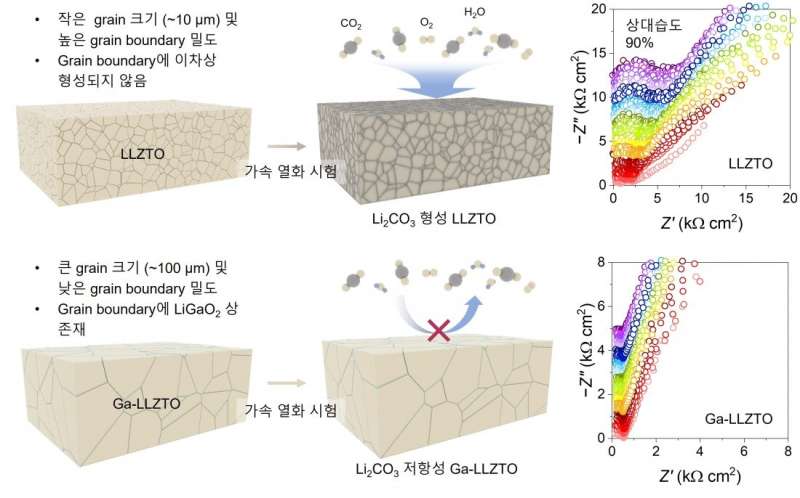#Development of next-generation solid electrolyte technology with enhanced atmospheric stability

Table of Contents
“Development of next-generation solid electrolyte technology with enhanced atmospheric stability”

Lithium ion batteries are widely used as energy storage systems for electronic products and electric vehicles. However, they are vulnerable to ignition as they are manufactured mainly with flammable organic liquid electrolytes, and safety issues continue to be raised.
On the other hand, oxide-based solid electrolytes have the advantage of having high thermal stability and physically preventing the growth of lithium dendrites. Among them, the Li7La3Zr2O12 (LLZO) electrolyte is considered as a next-generation electrolyte due to its excellent lithium ion conductivity.
Despite these advantages, the LLZO electrolyte has a problem—lithium carbonate forms on the surface due to reaction with moisture and carbon dioxide when exposed to the atmosphere. Lithium carbonate is formed on the surface and then grows along the grain boundaries, penetrating into the solid electrolyte and disturbing the transfer of lithium ions, which lowers the lithium ion conductivity of the LLZO solid electrolyte.
Professor Lee Jong-won’s team of the Department of Energy Science and Engineering at DGIST, together with Professor Moon Jang-hyeok’s team from the Chung-Ang University, announced the development of solid electrolytes with enhanced atmospheric stability.
The research team improved the atmospheric stability of the LLZO electrolyte through the hetero-elemental doping of gallium and tantalum (i.e., by adding gallium and tantalum to pure LLZO electrolytes). In particular, it was verified that LiGaO2, a third material formed through the addition of gallium, suppresses the surface adsorption of moisture and carbon dioxide, and promotes the growth of particles during thermal treatment, thus preventing growth of lithium carbonate through grain boundaries and maintaining the lithium ion conduction properties of LLZO electrolytes.
As a result, it was empirically verified that lithium ion conductivity is maintained even when stored for a long time in the air, and stable performance was maintained even after repeated lithium electrodeposition/desorption.
DGIST Department of Energy Science and Engineering Professor Jong-Won Lee said, “I expect the solid electrolyte design concept presented by this research team to be helpful in developing high-performance/high-safety all-solid-state batteries incorporating solid electrolytes, which are stable in the atmosphere and have high lithium ion conductivity.”
The research results are published in the journal Energy Storage Materials.
Wooyoung Jeong et al, Tailoring grain boundary structures and chemistry of Li7La3Zr2O12 solid electrolytes for enhanced air stability, Energy Storage Materials (2022). DOI: 10.1016/j.ensm.2022.10.044
Provided by
Daegu Gyeongbuk Institute of Science and Technology (DGIST)
Citation:
Development of next-generation solid electrolyte technology with enhanced atmospheric stability (2022, December 29)
retrieved 29 December 2022
from https://techxplore.com/news/2022-12-next-generation-solid-electrolyte-technology-atmospheric.html
This document is subject to copyright. Apart from any fair dealing for the purpose of private study or research, no
part may be reproduced without the written permission. The content is provided for information purposes only.
If you liked the article, do not forget to share it with your friends. Follow us on Google News too, click on the star and choose us from your favorites.
For forums sites go to Forum.BuradaBiliyorum.Com
If you want to read more Like this articles, you can visit our Science category.




